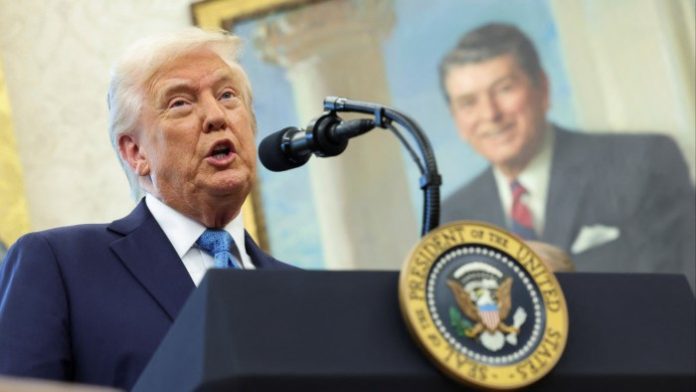Unlock the White House Watch newsletter for free
Your guide to what Trump’s second term means for Washington, business and the world
Donald Trump said he had “no intention” of firing US Federal Reserve chair Jay Powell, pulling back from a historic confrontation with America’s top central banker and sending global stocks higher.
The president has repeatedly hit out against the Fed chair’s refusal to cut interest rates and last week signalled he believed he could dismiss Powell before his term as central bank head comes to an end in May 2026.
Trump reiterated his complaints that the Fed needed to cut borrowing costs in comments in the Oval Office on Tuesday, but he added: “I don’t want to talk about that because I have no intention of firing him.”
Trump’s sustained criticism of Powell in recent days had rattled global markets and threatened the independence of the Fed, which helps underpin investors’ confidence in the global financial system.
Futures tracking the S&P 500 were up 1.7 per cent and those for the tech-heavy Nasdaq climbed 1.9 per cent on Wednesday, with the Stoxx Europe 600 up 1.3 per cent. Japan’s broad Topix rose 1.7 per cent and Hong Kong’s Hang Seng advanced 2.4 per cent.
The dollar index climbed 0.3 per cent, extending its rebound from a three-year low, while Treasuries rallied, with the yield on the 10-year falling 0.06 percentage points to 4.34 per cent. Gold, a haven asset, fell 2.4 per cent after hitting a record high of $3,500 per troy ounce on Tuesday.
Investors said the president’s pledge not to dismiss Powell proved there were some members of his inner circle who recognised that markets valued the independence of America’s major institutions.
“This shows there are some guardrails around this president,” said Dec Mullarkey, managing director at fund manager SLC Management. “This feels like [Treasury secretary Scott] Bessent’s touch,” he added.
“Clearly other folks have talked to [Trump] and explained that [firing Powell] would have caused huge volatility. Bessent recognises that the integrity of markets has to be maintained.”
Powell has repeatedly said that he would serve his full term as Fed chair and believed that his early dismissal would not be allowed under US law.
Investors’ concerns over his position rose after Kevin Hassett, director of the National Economic Council, said on Friday that Trump would “continue to study” the matter of dismissing Powell.
Financial markets sold off on Monday after Trump attacked Powell as “Mr Too Late” in a post on his Truth Social platform.
US stocks and the dollar largely recouped their losses on Tuesday after Bessent said the trade war with China was “unsustainable”. Trump also said he would strike a deal with China — something he has said repeatedly — and that tariffs would “come down substantially”.
The Fed has been on a collision course with Trump since shortly after he took office, but the attacks from the White House have intensified since the president launched his “reciprocal tariffs” on April 2.
Rate-setters, including Powell, have made clear that they will postpone any interest rate cuts until they are confident that Trump’s trade policies will not lead to a persistent rise in inflation.
The Fed chair and his colleagues have also made clear their concerns that Trump’s tariffs raised the prospect of lower growth and higher prices, weakening an economy that officials previously said was in good shape.
Trump took to Truth Social last Thursday saying Powell’s termination “could not come fast enough” after the Fed chair confirmed the previous day that the central bank would not come to the stock markets’ rescue and cut rates to counter fears that the tariffs would drive the US economy into recession.
Additional reporting by George Steer and Peter Wells in New York and Arjun Neil Alim and William Sandlund in Hong Kong




